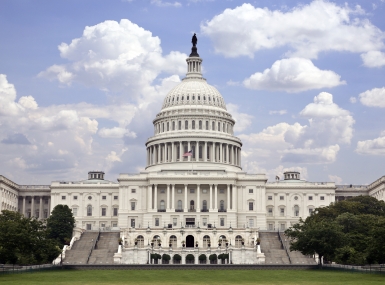Treasury Begins Implementing Extraordinary Measures as Debt Limit Deadline Looms
Author

Mike Belarmino
Upcoming Events
Related News
The Treasury Department announced, March 8, that it will suspend sales of Treasury Securities — state and local government series (SLGS), until further notice.
The suspension is aimed at helping the Treasury manage debt subject to the federal debt ceiling, which is the total amount of money that the United States government is authorized to borrow to meet its existing legal obligations.
The last time Congress acted on the debt ceiling was March 2015 when it passed the Temporary Debt Limit Extension Act, which suspended the debt ceiling until March 15, 2017.
SLGS are special purpose securities that the Treasury Department issues to state and local government entities, upon their request, to help them comply with federal tax laws and Internal Revenue Service arbitrage regulations when they have cash proceeds to invest from their issuance of tax exempt bonds.
A primary way SLGS can be seen in practice is through bond refundings. State and local governments commonly use bond refundings to achieve savings on interest costs by redeeming or retiring an outstanding bond issue using the proceeds from a new debt issue that is almost always at a lower interest rate.
Proceeds of a bond refunding are usually placed in an escrow account where they are held until the call date of the refunded bonds. While in escrow, the proceeds are typically invested and earnings are used to minimize the cost of the escrow.
SLGS generally are the recommended investment option rather than utilizing open market securities for escrow accounts for refunding bonds.
Now that the Temporary Debt Limit Extension Act has expired, the debt limit needs to be reset to approximately $20 trillion to reflect the nation’s current debt. Congress must act in the coming months to increase this limit. Until then, Treasury will implement “extraordinary measures” to potentially extend the timeframe in which Congress can act and keep the government from defaulting on its debt.
Suspension of SLGS sales has become a standard component of the extraordinary measures implemented by the Treasury Department over the past several years during partisan congressional and White House battles over increasing the debt ceiling.
The SLGS window is unlikely to reopen until fall, when the federal government will exhaust its borrowing ability. Until then, governments can buy Treasuries from brokerage firms as an alternative to SLGS, although doing so might be costlier.
Belarmino is a senior policy advisor at GFOA.
Attachments
Related News

U.S. Congress passes reconciliation bill: What it means for counties
On July 3, the U.S. Congress passed sweeping budget reconciliation legislation.

U.S. Senate passes amended reconciliation bill text: What it means for counties
On July 1, the U.S. Senate narrowly passed their version of sweeping budget reconciliation legislation.

County Leaders Visit Washington to Share Local Perspective on Budget Reconciliation
Elected officials from five states sound alarm about administrative and funding changes to SNAP and Medicaid.